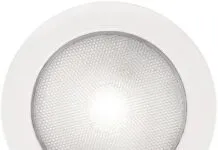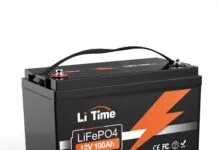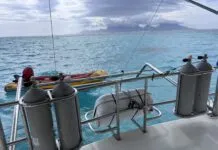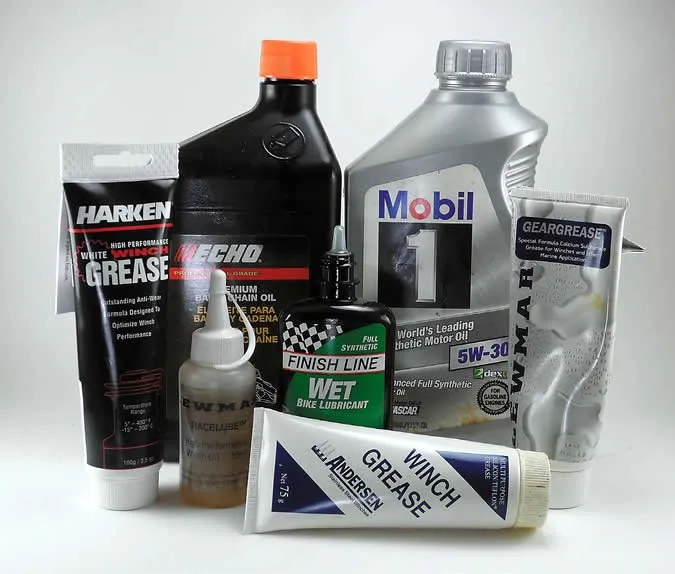Winch pawls require a different lube the rest of the winch. The only time they are moving is under practically no load, clicking along the ratchet wheel until the handle stops turning. A heavy packing of grease can stick and prevent full engagement, resulting in broken pawls, gouged ratchet wheels, and in the worse case, crew injury when the handle spins backwards.
The safe recommendation for a manufacture is a light oil. There is no worry about the user picking cheap grease or using too darn much. On the other hand, winch manufacture recommendations vary widely. Several major manufactures actually recommend a light coating of grease.
What We Tested
Although the lubricants industry produces countless specialty products, we restricted our testing to those that are readily available and that you may already have. First, we looked at pawl oils from Harken and Lewmar. We then added Mobil 1 automobile motor oil, Echo Chainsaw Bar Oil, Singer Sewing Machine Oil, 3-in-1 Oil, Finish Line Wet Bicycle Chain Oil, Valvoline Synpower 75W-80 Gear Oil, and Valvoline High Performance 85W-140 Gear Oil. Finally, we tested a thin coating of Anderson Winch Grease, Harken Winch Grease, Lewmar Winch Grease, and Green Grease.
How We Tested
Volatility was tested by coating standard ASTM aluminum and copper corrosion test coupons (bronze and aluminum are common pawl socket materials) with a thin layer of lubricant, heating to 275 F for 10 hours, and measuring loss in weight. This test is known to simulate 3-5 years of aging.
At the end of the test, we noted changes in appearance and viscosity. Wash-off and corrosion protection were tested using a modified salt spray chamber test. The aged coupons were joined by a second set with fresh coatings, and they were all sprayed with a 5 percent salt solution, allowed to dry, and repeated once per day for 10 days. At the end of the test period, the samples were visually observed.
Observations
Light oils, including 3-in-1 Oil, Singer Sewing Machine Oil, Harken Pawl Oil, and Lewmar Race Oil fared poorly in the evaporation and corrosion tests. Between 70 and 100 percent of the oil simply evaporated during the test period, leaving the metal nearly dry. Does oil for a heavy duty winch really need to be as light as that for a sewing machine?
Synthetics and heavier oils are far more resistant to evaporation. Mobil 1 did not evaporate, but it was vulnerable to wash-off due to detergents. Gear oils, on the other hand, are non-detergent, and both Valvoline products surprised us by outperforming even greases. We had high hopes for the chain saw oil, but high evaporation rates and a slight tendency to get sticky turned us away.
Singer Sewing Machine Oil
While just the thing for the fine mechanism of a sewing machine, this oil evaporated quickly, suggesting the pawl sockets may be bone dry after a few years in the summer sun. It also has little wash-off resistance and provides little corrosion protection, hazards not faced by sewing machines.
Bottom line: Not for winches.
3-in-1 oil
Another light oil, this popular oil performed like sewing machine oil.
Bottom line. Not for winches.
Harken Pawl Oil
Similar to Lewmar race oil, this light oil did not protect our coupons for long. It also evaporated too quickly.
Bottom line: You likely need to service your winch annually if you decide to use this oil.
Lewmar Race Oil
We expected improved evaporation resistance, but did not see it. Wash-off and corrosion resistance were slightly better than general purpose light oils.
Bottom line: You will need to service the winch annually if you use this oil.
Echo Chain Saw Bar Oil
Based on a napthinic base oil with high concentrations of tackifiers (the oil is stringy), we thought this might have the potential to stay in place better, but evaporation was high and thermal stability proved poor.
Bottom line: Good stuff… for chain saws.
Mobil 1 5W-30 Motor Oil
We expected very low evaporation rates from this synthetic oil and were not disappointed. The conventional wisdom is that motor oils have poor wash-off resistance due to their high detergent contents. This also proved true for the Mobil oil.
Bottom line: 5W-30 synthetic motor oil is our Budget Buy in lighter oils.
Valvoline High Performance 85w-140 Gear Oil
Evaporation was very low and oxidation stability very good. Because of increased viscosity the film thickness is obviously greater, but it did not inhibit pawl movement, even at sub-zero temperatures. Wash-off resistance and corrosion protection were superior to grease.
Bottom line: This is Our Best Choice and Best Buy for extended protection of winch pawls.
Valvoline Synpower 75W-80 Gear Oil
Evaporation is nil and oxidation stability impressive. Viscosity is relatively low, about that of an SAE 30 straight weight oil, resulting in fast pawl movement. Corrosion protection is good, but not as good as Finishline Wet oil.
Bottom line: Recommended for winch pawls.
Finish Line Wet Bike Lubrican’t
Optimized for bicycle chains, often operating in a wet, dirty environment, chain oil is about the same viscosity as Valvoline Synpower, but its high levels of tackifiers prevent sling-off. As a synthetic, evaporation was nil, and wash-off and corrosion protection were a very close second place.
Bottom line: Recommended for winch pawls. We wonder if other bike oils are as good or better.
Andersen Winch Grease
Considerably thinner than other winch greases, this lube is recommended by Anderson for the entire winch, including the pawls. Applied as a thin coating, it stays in place, gives good corrosion protection, and still gives smooth, quick pawl action. Anderson grease did well in previous PS testing, so we have zero concern of it stiffening over time.
Bottom line: Recommended for total winch maintenance, and our Best Choice for the pawls.
Harken Winch Grease
Slightly heavier that Anderson winch grease, we like it but would keep it out of the ratchet area.
Bottom line: Recommended for gear and bearings, but not pawls.
Lewmar Winch Grease
Slightly heavier than Anderson winch grease, we like it but would keep it out of the ratchet area.
Bottom line: Recommended for gears and bearings, bust not pawls.
Conclusions
Modern lubricants make significant extension of service intervals practical, but only if you pick the right products. The lightest oils evaporate within a year and provide poor wash off and corrosion resistance.
Light gear oil and bicycle chain oil do a better job of staying in the pawl sockets where they belong. For winches with pawls at the bottom, where grease could migrate downwards onto the pawls, so long as you use a PS recommended synthetic grease on the gears and stick to a relatively light coating, we don’t see a serious risk.
We believe service intervals up to five years are safe for even regular sailors. Racers and cruisers will want to adjust this frequency, based upon what they see at one and two year checks.
A very wet boat, with spray over the deck and the rail in the water, will require more frequent service than a dry boat. If you accept the longer service interval, consider replacing the springs every time; they are a wear item and a failed spring can lead to increased ratchet wear and winch failure. Properly maintained, the pawls themselves last a very long time.
For extended service, we like Valvoline High Performance 85W-140, with Finish line Wet Bike Lubrican’t as a close second. We also liked Andersen Winch Grease, the thinnest of its type.
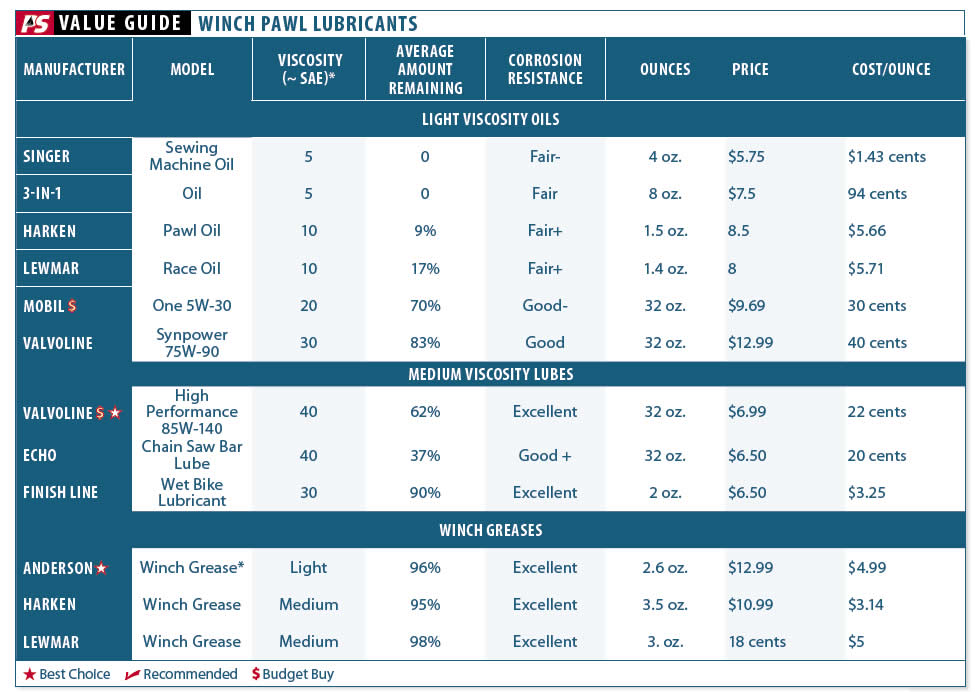
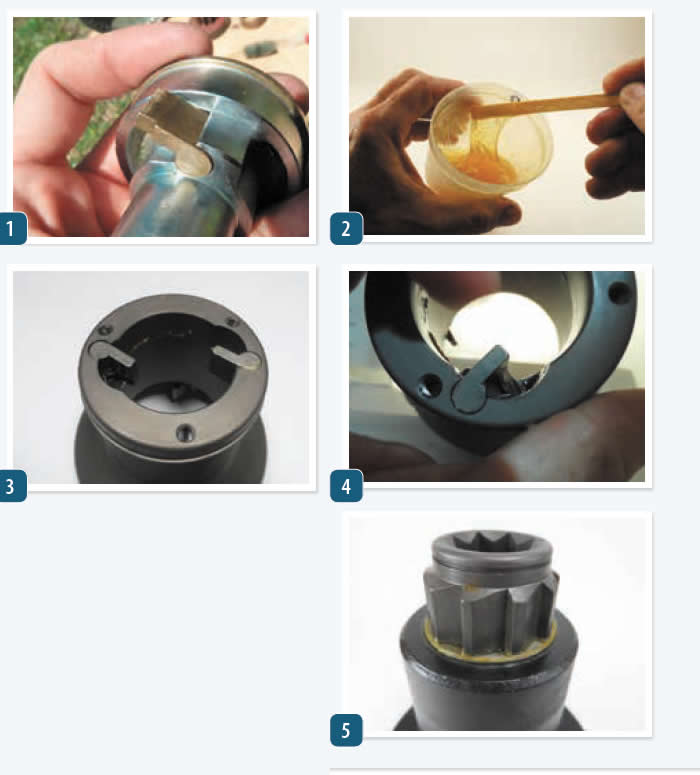
Corrosion protection and lubricity are key characteristics in any marine lubricant. But for winch pawl lubes, viscosity is particularly important. Too sticky and the pawl doesnt open to engage the gears, too light and the lubricant can wash away, resulting in the gradual wear of the pawl and seat.
Ideally, winches should be inspected biannually, although some boats go years without taking a peek. Any new owner of a second-hand boat will want to inspect their winches.
- A worn pawl. Unless you have a replacement pawl on hand it can be hard to tell if the pawl or seat is worn.
- A small amount of tackifier makes the oil far more clingy. Nearly all oils contain them.
- A Lewmar 7 winch after cooking. After heating for 10 hours the winches were chilled to -10F and checked for function. None of the lubricants in the review failed.
- At -10 F lithium grease traps the pawl for a fraction of a second. It did not stick before aging or at 32F.
- An open Lewmar winch reveals its coating of factory grease.




















